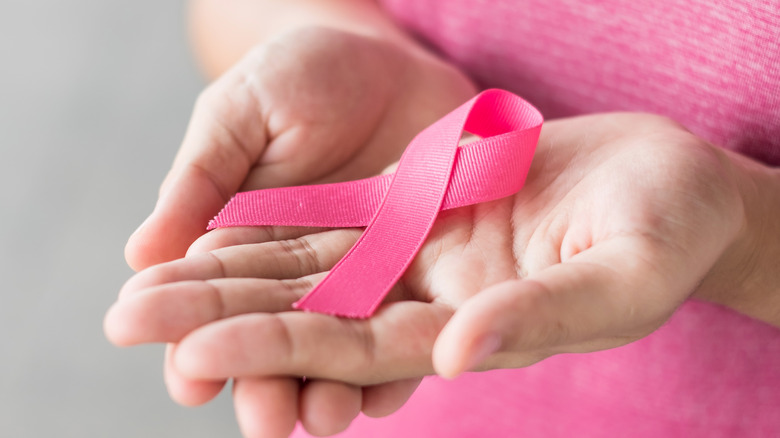How Advances In Chemotherapy May Reduce The Need For Mastectomies
October is breast cancer awareness month, which aims to help people understand the risks and seek tests for breast cancer (via New Mexico Department of Health). But year-round, medical professionals and experts are educating the public to look out for symptoms every woman needs to know, including finding a lump in their breast, pain or tenderness in her breast, sudden changes including nipple discharge, and even a change in bowel movements.
The U.S. Food & Drug Administration has also issued new guidance on mammograms, particularly when it comes to diagnosing women with dense breasts. That's good news since breast cancer screenings in the recommended timeframe depending on age (per the Centers for Disease Control and Prevention) are crucial to early detection. For those who do receive a diagnosis, there are many treatments depending on the type of cancer and how far it has spread, including surgery, chemotherapy, and radiation therapy, the CDC explains.
But as scientists continue to study the disease, recommendations often change. One study found that some breast cancer patients might benefit from less radiation treatment, with data showing that three weeks of radiation therapy with a higher dose of radiation, as well as a radiation boost to the site after a lumpectomy, can safely deliver the same result as four to six weeks of radiation at a lower dose.
And now another study has shown that advances in chemotherapy might save some breast cancer patients from having to undergo surgery.
New research shows some breast cancer patients could skip surgery after chemo
New research shows that some patients diagnosed with early-stage breast cancer that receives chemotherapy were able to avoid having breast surgery. In fact, many of the women are cancer-free and remain in remission two years after their treatments.
The study included 50 patients, all over age 40 who had either triple-negative breast cancer or HER2-positive breast cancer in the early stages. All of the women underwent chemotherapy, followed by biopsies to determine how their tumors responded to the treatment. The data showed that 31 patients — around 60% — responded so well that they were able to skip surgery. All of the participants went on to receive radiation treatment.
While the authors of the study warned that more research is needed, the initial data is promising. "This is the very beginning of a new field that is rapidly advancing," Dr. Henry M. Kuerer, Ph.D., lead author of the study and executive director of Breast Programs and Robinson Endowed Distinguished professor at MD Anderson Center at the University of Texas, told Medical News Today. "The plane has left the gate and is now on the runway. It is clear that targeted systemic therapies are greatly improving, from about a 12% pathologic complete response 20 years ago to 70% in triple-negative breast cancer today."

